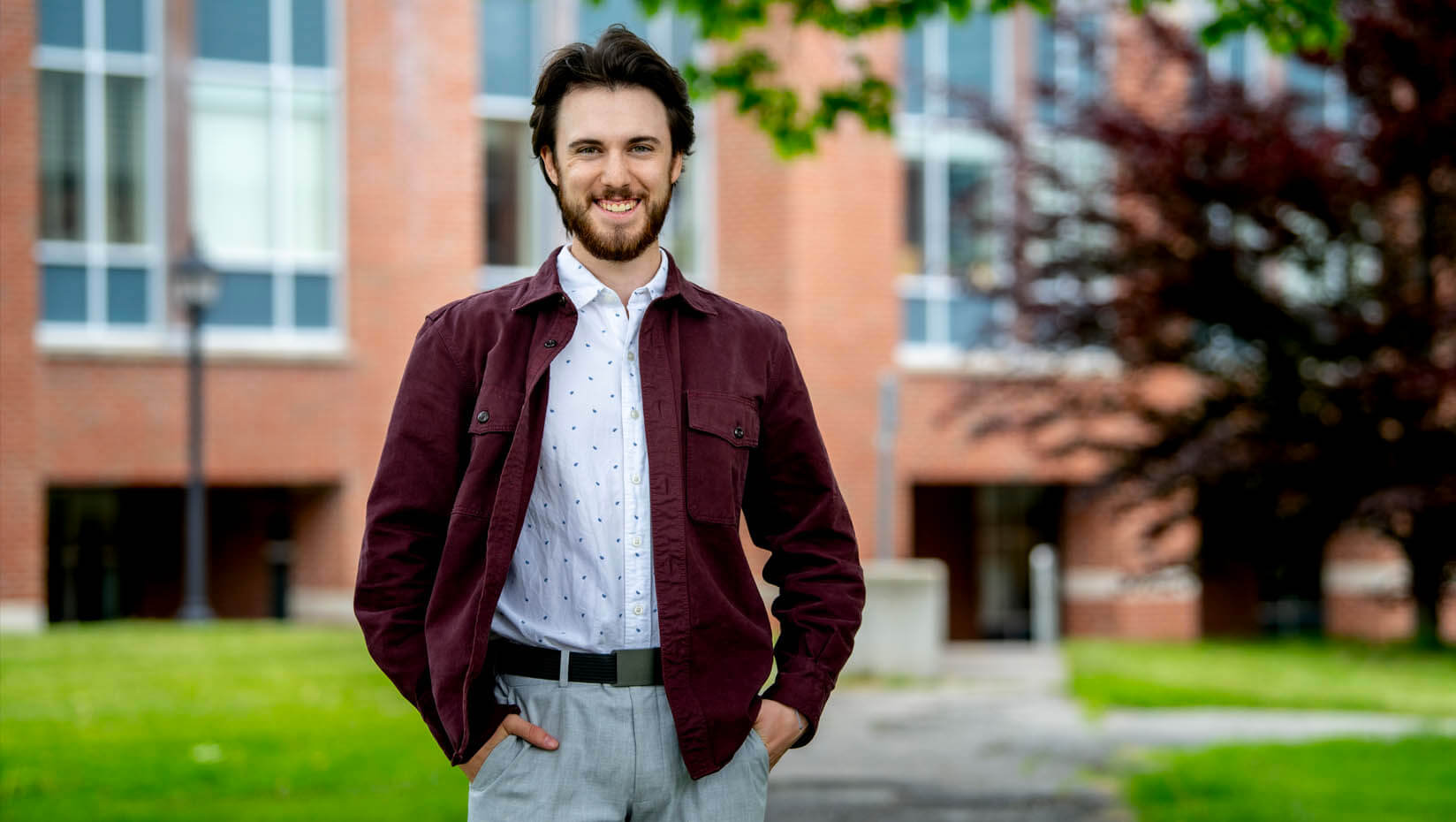
Samuel Weafer: Using student research to become a better scientist
When Samuel Weafer decided he wanted to do research as an undergraduate, the perfect project and the right mentor seemed to find him. Weafer’s research experience in Benjamin King’s lab in the Department of Molecular and Biomedical Sciences has taught him invaluable scientific skills, but he says it has also shown him that it is OK to fail — and that, more than anything, has made him a better scientist.
Weafer says that he started studying molecular and cellular biology “kind of accidentally.” He had always been interested in science, but was not an especially motivated student before arriving at UMaine.
“I was just looking for a science major and I wanted to take something cool,” Weafer says. “I found molecular and cell biology, and the rest is history. It was the best decision I ever made.”
Weafer says he “almost got destroyed” his first year in the major, but he was too interested in the subject to give up. As he started taking higher level courses — Immunology, Molecular Genetics and Advanced Biochemistry were a few of his favorites — he says his GPA has “skyrocketed.”
“I learned a lot of things about myself as a student and my learning process,” Weafer says. “It just takes time and dedication, and you just have to work at it.”
The summer after his sophomore year, Weafer did an internship at ElevateBio, a biotechnology company in Massachusetts. When he came back to school, he wanted to continue developing his research skills and started looking around at different labs in the department. He tagged along with a friend to the King lab, where he happened to meet his future mentor, Ph.D. student Brandy Soos. He told her he was interested in gateway cloning, a process that uses bacteria to manipulate genetic material for use in experiments.
“She kind of recruited me,” Weafer says. “We were a good match. I was interested in this project and had a goal, and she had a project ready for me.”
Over the past year, Weafer has worked with Soos in the lab to help create new transgenic zebrafish needed to study genes that regulate the inflammatory response following viral infection. The goal is to have a zebrafish that will express a fluorescent protein when one of the inflammatory genes is turned on in a specific immune cell. Confocal microscopes can then be used to study where and when the gene is expressed in the zebrafish. Weafer is using a molecular biology method, called Gateway cloning, to arrange segments of DNA copied from the zebrafish gene next to DNA that codes for a fluorescent protein into bacteria. After many steps, the engineered DNA produced by the bacteria can then be inserted into the genome of the zebrafish.
However — as often happens when on the cutting edge of science — Weafer has run into some challenges.
“We had a lot of really bad samples,” Weafer says. “You can’t do anything unless your DNA is pure, uncontaminated and unaltered, and there’s a number of different things that can cause reactions to fail.”
Weafer is confident that his experiment will eventually work, but he is feeling a time crunch, as he is set to graduate next year.
“The reason people spend 10, 20, 30 years on projects is because science just takes time,” Weafer says. “Failure is part of the process and it’s how we optimize our protocols.”
Weafer says that throughout the process, his mentorship from Soos has been invaluable.
“She is always ready to problem-solve and she wants me involved in the process,” Weafer says. “We’ve figured out a lot of our research-related issues. I think we’ve made a lot of progress on that front.”
While Weafer waited for a new gateway cloning kit to revamp his project next year, he worked at ElevateBio again this summer. The work he did there is different from what he does in King’s Lab. At ElevateBio, Weafer focused on cancer immunotherapies, specifically for blood cancers like leukemia, but what he learned in the lab still applied to his internship.
“As far as being methodical and comfortable with learning new protocols, it will have an immediate effect,” Wear says. “I am a much better scientist than I was a year ago.”
After Weafer graduates next year, he plans to attend the Roux Institute at Northeastern University in Portland for the biotechnology program, pursuing a master’s degree in biotechnology with a concentration in business development with the goal of running his own biotechnology company. Even if he doesn’t pursue research professionally, Weafer says that King’s lab has been an invaluable learning experience.
“It’s provided me with the raw skills and the resistance to failure,” Weafer says. “Those things are super important and I think everybody needs to have industry and academic experience.”
Weafer thinks that all undergraduates who are interested in science should get involved with research, even if they find the coursework challenging.
“It’s fun and you get to sit and do cool stuff that you care about,” Weafer says. “I think everybody needs to give it a try.”
Contact: Sam Schipani, samantha.schipani@maine.edu
